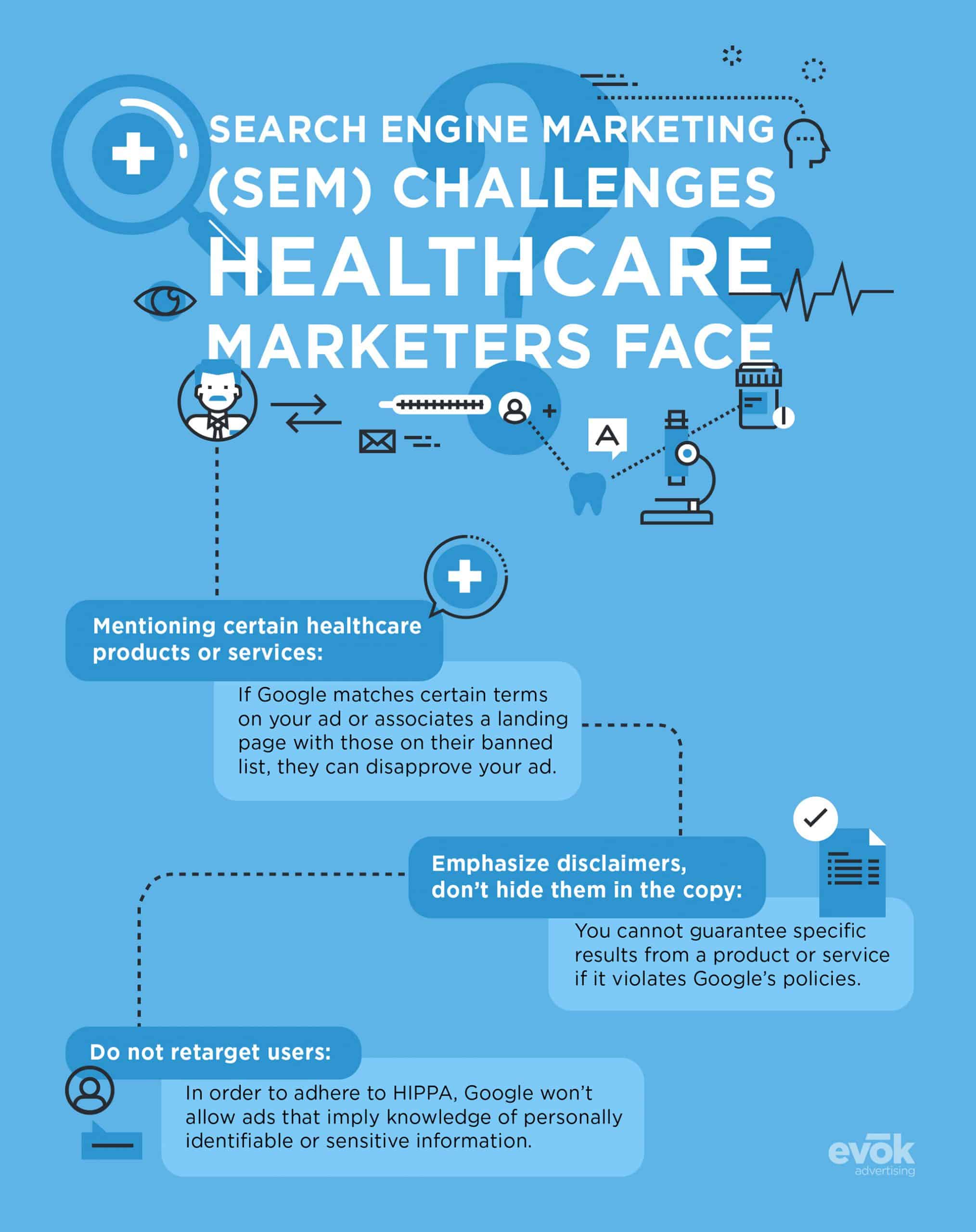
Top Google Healthcare Search Engine Marketing (SEM) Challenges

Has your hospital, medical department, or private practice been using Google Ads to promote your business to prospective patients, but have seen your ads disapproved? Or worse, your Google Ads account has been banned. Are you wondering where you went wrong? This is a common scenario that medical marketers face due to a lack of awareness surrounding Google’s latest advertising policies concerning healthcare and pharmaceutical advertisements. We’re here to explain the challenges the healthcare marketers commonly face in their search engine marketing campaigns and give you tips on how to avoid having your ad disapproved.
- Mentioning certain healthcare products or services: If Google matches certain terms on your ad or associated landing page with those on their banned list, they can disapprove of your ad.
- Emphasize disclaimers, don’t hide them in the copy: You cannot guarantee specific results from a product or from your services as it violates Google’s policies.
- Do not retarget users: In order to adhere to HIPPA, Google won’t allow ads that imply knowledge of personally identifiable or sensitive information.
You Cannot Promote Certain Healthcare Products or Services
The first challenge for healthcare marketers is that certain products and services cannot be advertised at all. This should be simple to avoid, yet many unaware healthcare advertisers can still find their ads banned from using drug terms or procedures that Google does not allow. In some cases, products and services will only reach a limited audience, rather than getting banned altogether. For example, a low-testosterone clinic would have to be very careful phrasing their advertisements, as Google may consider the ad to be banned adult content.
Essentially, if Google matches certain terms on your ad or associated landing page with those on their banned list, they can disapprove of your ad. These terms may be related to anabolic steroids, weight loss, ephedra, and specific pharmaceuticals and supplements. A full list of banned healthcare terms in Google advertising can be found here.
Certain Phrasing Will Get Your Ad Banned
Another challenge that healthcare marketers face is using certain phrasing that is against Google’s violation policies. For example, you cannot guarantee specific results from a product or from your services. A disapproved statement would be “Patient lost 25lbs in 90 days,” but “Patient lost 25lbs using this product” would be approved. A good rule of thumb to follow is not specifying a guaranteed outcome in a set time frame. Such claims need to always include a disclaimer on your website or advertisement’s landing page.
If you display before-and-after images on your landing page, make sure to use phrasing such as “results may vary.” Additionally, switch terms like “will make” to “can make” and “eliminates” to “helps reduce” in order to decrease your chances of having your ad disapproved.
It’s also important to ensure that any landing page is ad copy that actually matches or lines up with the landing page copy. Google’s algorithms can detect that an ad for diabetes leads to a landing page without any information about diabetes whatsoever.
Prospective Patients that Interacted with Your Ad Cannot Be Retargeted

Imagine a prospective patient is experience symptoms like frequent trips to the bathroom, night sweats, and low energy. They begin conducting Google searches which leads them to believe that they have prostate cancer. Maybe they begin to surf search engines looking for a physician near them, or maybe they decide to schedule a colonoscopy. They would probably not want ads for prostate cancer popping up on their home computer for all their family members to see.
In order to adhere to HIPPA, Google won’t allow ads that imply knowledge of personally identifiable or sensitive information. Because of this, medical marketers are not able to use retargeting techniques in their Google Ads campaigns. If someone visits your website or clicks on your ad, healthcare organizations like hospitals or private practices cannot use display advertising to lure that person back due to patient privacy concerns.
In order to utilize retargeting without violating Google regulations, you need to get creative with your copy. Instead of mentioning health conditions a prospective patient may have recently searched, highlight your healthcare company’s expertise in a certain department. If a user visits your healthcare site looking for information on nephrology and leaves without converting, promote ads that highlight your department and don’t mention kidney disease symptoms.
In conclusion, here are four tips that will help you get your healthcare ad approved the first time:
- Talk about your business, not your customer;
- Focus on a positive message, not negative symptoms;
- Talk about your products and services, not your audience’s problems;
- If you’re going to use images in your ad campaign, show happy, empowered people of all body types and demographics, not people who look like they are losing hope.